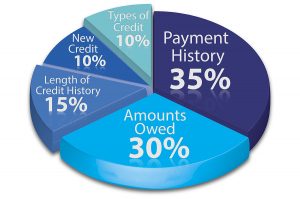How Credit Scores Affect Qualifying for a Home Loan
What is credit?
The credit scoring system was originally designed in the 1950s to help lenders determine how well consumers could pay back borrowed money. While there have been many updates to how this system is used, the components of a credit score consist of these major factors:

What can impact my credit score?
Paying off debts on time has the most significant positive impact on your credit score. Late payments, judgments, and charge-offs all have a negative impact. Keeping lower balances on the open credit accounts you have is a sure way to keep that score going up! The longer you have a positive credit history, the better. However, multiple credit inquiries in a short period of time, such as applying for multiple credit cards, can have a negative influence on your score. The type of credit you have is also a factor. Having a mix of credit, such as an auto loan and a credit card, is more positive than a combination of debt from multiple credit cards.
What if I don’t have any or enough credit?
There are simple ways to begin building a credit history. Start establishing a credit history by opening a small line of credit with your bank or credit union and begin making minor purchases that can be easily paid off. Your bank may offer a secured credit card if this is your first time applying for credit. This type of card works like a debit card and will require deposited funds for purchases; just be sure your history will be reported to all three credit bureaus.
What if I have less than perfect credit when applying to purchase a home?
Knowing what is on your credit report is the first step. Obtaining a credit report will show which areas are helping your score and which areas need to be worked on. When applying for a mortgage, your loan officer will be able to see if there are any areas that need work to help you get on the right track for a future purchase.
The Importance of Good Credit
It’s no secret when we tell you that the better your credit score is, the easier your life can be. Your credit score is a three-digit number that represents how trustworthy you are from the perspective of someone that would lend you money for something like a loan or a mortgage. In fact, your credit is THE single most important determining factor from a lending perspective.
Credit Checklist
ALWAYS pay your bills on time
This is a given! It is also important to make an effort to pay more than the minimum balance if possible.
Have a mix of credit
Mix auto, credit cards, student loans, etc. Lenders like to see long and versatile credit history.
Keep a low balance
Try not to use more than 30% of your limit on any given credit card
Start saving now
It is ideal to try and aim to put a 20% down payment on your home, which requires a decent amount of cash upfront. Start bulking up your savings account now!
Don’t forget about closing costs!
Impact on Rates
Our economy runs on credit. So what is so important about those 3 numbers, and how does it impact your mortgage rates when you decide to buy a home? Here’s what you need to know:
Your credit report: Your financial report card. You want all A’s – Like we mentioned before, your credit score is a representation of how well you can handle your money and can make or break a lender’s decision to approve you for a loan or mortgage, and impact your interest rates majorly. Your credit report is made up of how much money you’ve borrowed, your history of paying it back, and how much open credit is available to you. Here is what appears on your credit report: debts and a history of how they’ve been paid, public record information (tax liens, bankruptcies), bills referred to collection agencies, and inquiries made about your creditworthiness.
Credit score: Credit scores range from 300-850 points and are based on debt, the amount of time you’ve used credit, debt totals, how often you apply for new credit, and types of credit you currently use based on information received from your credit report.
The higher your credit score, the lower your interest rates will be, and vice versa- The better your credit score is, the more banks and lenders can trust you, resulting in much lower interest rates for loans and mortgages. Don’t think interest rates are that big of a deal? Consider this- for a long-term credit loan such as a mortgage, interest alone can add thousands of dollars to your original buying price. Ouch.
Banks aren’t the only ones who look at your credit – so do landlords, employers, insurance companies, utility companies, phone companies, and more!
Having good credit is essential for having a healthy financial presence. So now that you understand how vital it is, check out these tips for improving your credit before shopping for a mortgage!










